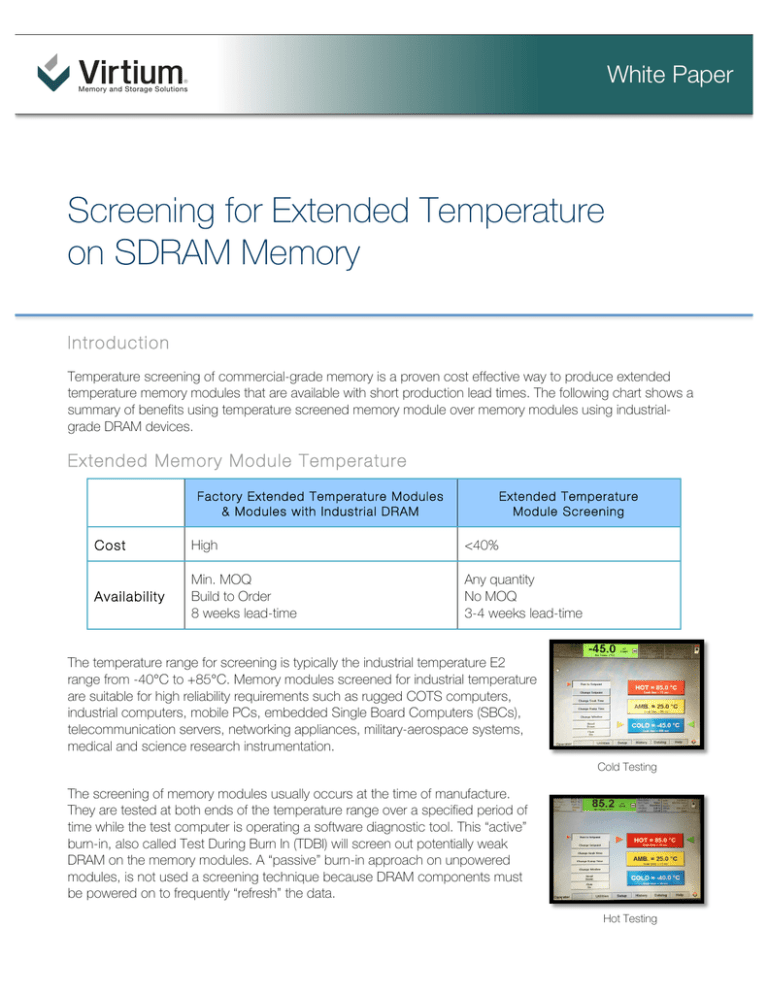
White Paper
®
Memory and Storage Solutions
Screening for Extended Temperature
on SDRAM Memory
Introduction
Temperature screening of commercial-grade memory is a proven cost effective way to produce extended
temperature memory modules that are available with short production lead times. The following chart shows a
summary of benefits using temperature screened memory module over memory modules using industrialgrade DRAM devices.
Extended Memory Module Temperature
Factory Extended Temperature Modules
& Modules with Industrial DRAM
Extended Temperature
Module Screening
Cost
High
<40%
Availability
Min. MOQ
Build to Order
8 weeks lead-time
Any quantity
No MOQ
3-4 weeks lead-time
The temperature range for screening is typically the industrial temperature E2
range from -40°C to +85°C. Memory modules screened for industrial temperature
are suitable for high reliability requirements such as rugged COTS computers,
industrial computers, mobile PCs, embedded Single Board Computers (SBCs),
telecommunication servers, networking appliances, military-aerospace systems,
medical and science research instrumentation.
Cold Testing
The screening of memory modules usually occurs at the time of manufacture.
They are tested at both ends of the temperature range over a specified period of
time while the test computer is operating a software diagnostic tool. This “active”
burn-in, also called Test During Burn In (TDBI) will screen out potentially weak
DRAM on the memory modules. A “passive” burn-in approach on unpowered
modules, is not used a screening technique because DRAM components must
be powered on to frequently “refresh” the data.
Hot Testing
IEEE conducted a study which concluded that DRAM devices can be “uprated” for elevated temperature and
used outside the manufacturer-specified temperature range for extended periods of time [1]. Virtium has
logged thousands of test hours with significant test data to show that temperature screening of commercialgrade memory modules (0 to +70°C) is a viable alternative to memory modules made with more expensive
industrial grade memory devices (-40 to +85 °C).
A Case for Temperature Screening
Temperature screening as a viable alternative is based in the fact that there is a certain amount of overrating
on the absolute maximum ratings and recommended operating conditions specified in DRAM data sheets.
1. Absolute maximum ratings (AMR) are limits for the “reliable” use of parts.
2. Recommended operating conditions are the conditions for which electrical functionality and specifications
are guaranteed.
This indicates that the device temperature ratings are set for electrical performance reasons as opposed to
package or device reliability reasons. The part temperature ratings are designated in the recommended
operating conditions for parts. The limits for reliable operation of parts are designated by the absolute
maximum ratings, but use at AMR conditions do not imply catastrophic failure. Almost all data sheets contain
some form of warning statement or disclaimer to discourage or prohibit use of the parts at or near absolute
maximum ratings.
None of these warnings point to any catastrophic failure at the AMR condition:
1. These are stress ratings only.
2. Stresses above these ratings can cause permanent damage to the parts.
3. Functional operation is not implied in these ranges.
4. Exposure to these conditions for extended periods may affect reliability and reduce useful life.
In addition to the extended temperature screening methodology mentioned above, there are two Bill of Material
(BOM) items that are part of the design for temperature screened memory modules. The first is the use
selected stabilized DRAM die revisions from the DRAM device manufacturers and the other is the use of high
speed DRAM for improved timing margins.
Beyond extended temperature screening, there are additional enhancements that provide further protection in
environments with high moisture, humidity, shock, vibration or low flow air cooling:
•
Conformal Coating, Type 1B31 acrylic, MIL-I-46058 Rev. C. Type AR
•
Under-fill, epoxy-based
•
Thermal sensor, SPD defined for increase DRAM refresh rate or fan speed
•
Thermal heat spreader and/or aluminum heat sink
Virtium manufactures memory and storage solutions for the world’s top industrial embedded OEMs. For two
decades we have designed, built and supported our products in the USA - fortified by a network of global
locations. Our world-class technology and unsurpassed support provide a superior customer experience that
continuously results in better industrial embedded products for our increasingly interconnected world.
© Copyright 2015. All rights reserved. Virtium®, Storfly® and TuffDrive® are registered trademarks of Virtium
Technology Inc. All other non-Virtium product names are trademarks of their respective companies.
30052 Tomas | Rancho Santa Margarita, CA 92688
Phone: 949-888-2444 | Fax: 949-888-2445
www.virtium.com
WP012-0315-01
